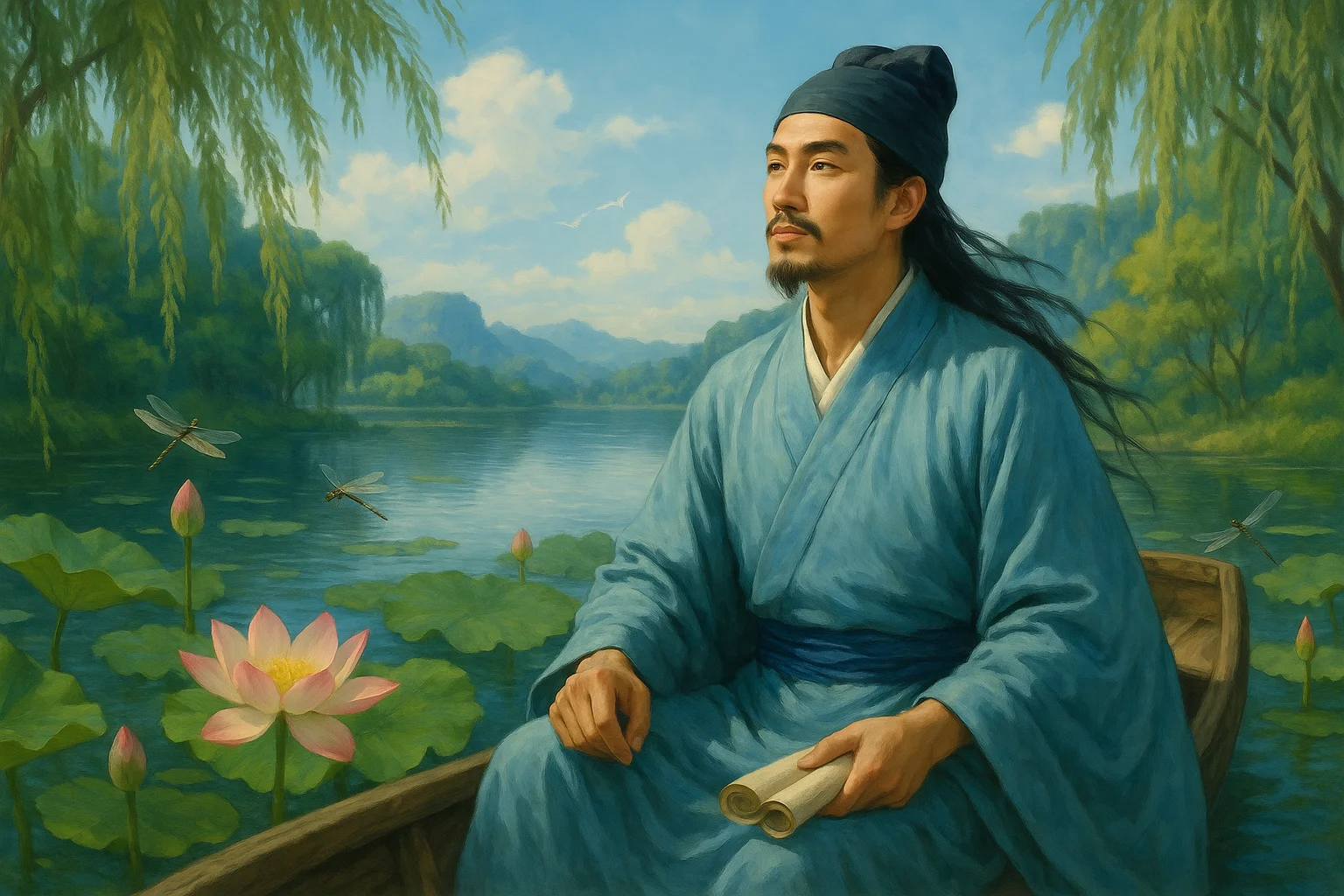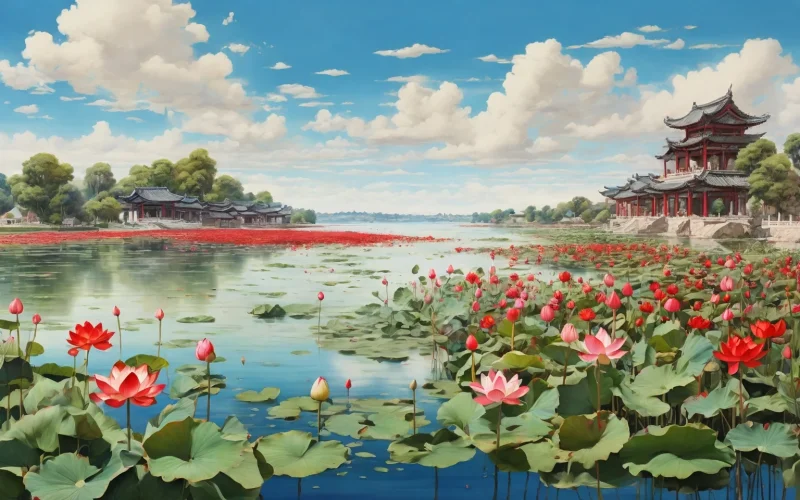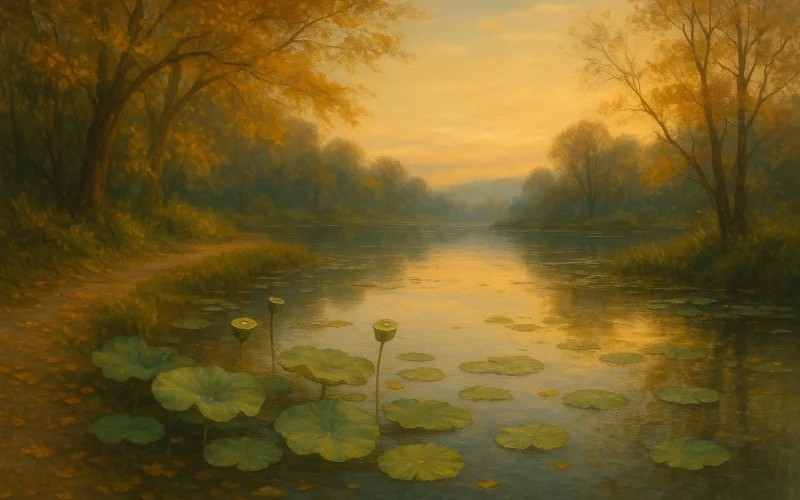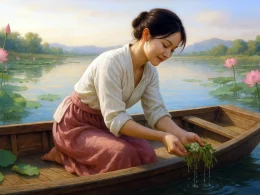The fountain's mouth with silent care doth feed
The slender stream—a liquid thread of need.
Tree-shadows love where sunlit ripples play,
While lotus points in pointed green array
Are perched by dragonflies in patient grace—
Life's tender watch o'er childhood's budding space.
Original Poem
「小池」
杨万里
泉眼无声惜细流,树阴照水爱晴柔。
小荷才露尖尖角,早有蜻蜓立上头。
Interpretation
Composed in 1176 at Yang Wanli's ancestral home in Jishui, Jiangxi, this quatrain exemplifies the "Chengzhai Style"—finding cosmic wonder in microcosm. Written during early summer when lotus buds first pierced the water and dragonflies hovered, the poem transforms a mundane household pond into a theater of ecological intimacy through personification and kinetic precision.
First Couplet: "泉眼无声惜细流,树阴照水爱晴柔。"
Quán yǎn wú shēng xī xì liú, shù yīn zhào shuǐ ài qíng róu.
The spring's mouth—silent—
spares its slender trickle;
Tree shadows adore the pool's
sunlit softness.
Yang animates the inanimate with Confucian empathy: the spring "spares" (惜) like a frugal scholar, the shadows "adore" (爱) like doting parents. This tender personification dissolves boundaries between human and natural realms, crafting an ecosystem where all elements exist in mindful reciprocity.
Second Couplet: "小荷才露尖尖角,早有蜻蜓立上头。"
Xiǎo hé cái lù jiān jiān jiǎo, zǎo yǒu qīngtíng lì shàng tou.
Tiny lotus—just
unsheathing pointed buds—
already hosts
a dragonfly's poised landing.
Here, nature's choreography dazzles: the imperative "just" (才) and "already" (早) compress time to highlight ecological symbiosis. The lotus' upward thrust ("pointed buds") meets the dragonfly's downward grace ("poised landing"), creating a perfect moment of interspecies balance—an ephemeral still point the poet immortalizes.
Holistic Appreciation
Yang Wanli's genius lies in telescoping perspective. The first couplet's macro view (spring, trees) yields to microscopic drama (bud, insect) without losing cosmic resonance. Each element exists in dynamic equilibrium: the restrained spring feeds the pool that nurtures the lotus that attracts the dragonfly—a chain of quiet dependencies.
This ecological harmony mirrors Confucian relational ethics, where every being has place and purpose. The pond becomes a self-regulating universe, its beauty emerging from reciprocal attentions—the spring's "sparing," the shadows' "adoring," the lotus' hosting.
Artistic Merits
- Anthropomorphic Ecology
Verbs like "spare" and "adore" construct a nature imbued with human-like care, prefiguring modern environmental empathy. - Temporal Telescoping
The shift from geological time (spring's eternal flow) to insect-time (dragonfly's instant) mirrors Buddhist mindfulness. - Haiku-like Precision
Twenty-eight characters capture an entire food chain, achieving "less is more" mastery. - Kinetic Stillness
The dragonfly's landing—a fleeting moment frozen in verse—echoes Zen ink paintings' arrested motion.
Insights
Yang Wanli's pond teaches us to read nature as scripture. His "silent spring" critiques human wastefulness; the shadows' "adoration" models contemplative attention; the lotus-dragonfly symbiosis celebrates interspecies harmony. In an age of climate crisis, this 12th-century poem feels startlingly prescient—a reminder that ecological wisdom begins with noticing small reciprocities.
For creators, it demonstrates how limitation breeds innovation: by restricting scope to one pool, Yang reveals universal truths. His technique—zooming from landscape to insect—offers a template for finding infinity in intimacy.
About the Poet

Yang Wanli (杨万里 1127 - 1206), a native of Jishui in Jiangxi, was a renowned poet of the Southern Song Dynasty, celebrated as one of the "Four Great Masters of the Restoration" alongside Lu You, Fan Chengda, and You Mao. He attained the jinshi degree in 1154 and rose to the position of Academician of the Baomo Pavilion. Breaking free from the constraints of the Jiangxi School of Poetry, he pioneered the lively and natural "Chengzhai Style," advocating for learning from nature and employing plain yet profound language. His poetry, often drawing inspiration from everyday life, profoundly influenced later schools of lyrical expression, particularly the Xingling (Spirit and Sensibility) School.












